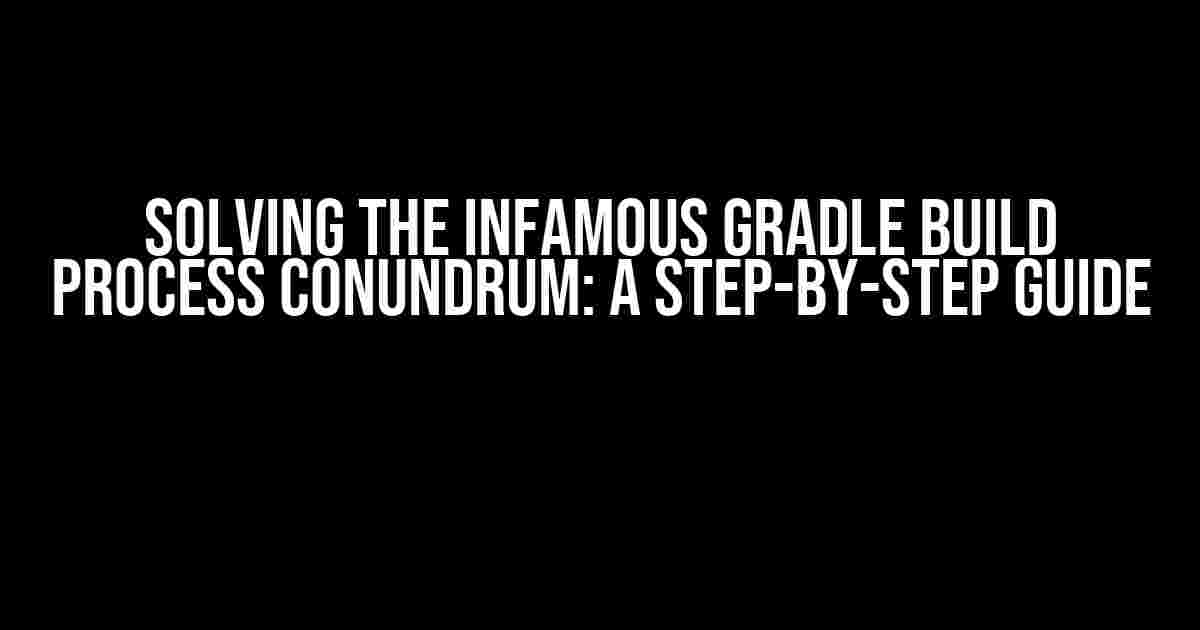Are you tired of staring at the loading wheel, wondering what’s holding up your Gradle build process? Join the club! Many developers have been there, done that, and got the t-shirt. So, you’re not alone when you say, “I’m having an issue with my Gradle build process. It seems to get stuck.”
Before We Dive In: A Quick Primer on Gradle
Gradle is an incredible build tool that helps you manage dependencies, compile code, and package your project. But, like any complex system, it can be finicky at times. Before we tackle the stuck build process, let’s quickly cover some essential Gradle concepts:
- Build Script: The build.gradle file contains the build logic, dependencies, and configuration for your project.
- Tasks: These are individual actions executed by Gradle during the build process, such as compiling code or creating archives.
- Dependencies: These are external libraries or modules required by your project, managed by Gradle.
Troubleshooting 101: Identifying the Issue
To resolve the stuck build process, you need to identify the root cause. Let’s go through some common scenarios:
Scenario 1: Inconsistent Dependency Versions
When working with multiple dependencies, it’s easy to end up with version conflicts. Check your build.gradle file for inconsistent versions:
dependencies {
implementation 'com.squareup.okhttp:okhttp:2.7.5'
implementation 'com.squareup.okhttp3:okhttp:4.2.1'
}
In this example, okhttp and okhttp3 have different versions. Fix this by aligning the versions:
dependencies {
implementation 'com.squareup.okhttp:okhttp:4.2.1'
implementation 'com.squareup.okhttp3:okhttp:4.2.1'
}
Scenario 2: Corrupted Gradle Cache
Sometimes, the Gradle cache becomes outdated or corrupted, causing build issues. Try the following:
gradle --stop rm -rf ~/.gradle gradle build
This will stop the Gradle daemon, delete the cache, and rebuild your project.
Scenario 3: Missing or Incorrect Plugin Configurations
Gradle plugins can be picky about their configurations. Double-check your plugin settings:
apply plugin: 'java'
apply plugin: 'idea'
repositories {
mavenCentral()
}
java {
sourceCompatibility = JavaVersion.VERSION_1_8
targetCompatibility = JavaVersion.VERSION_1_8
}
In this example, the Java plugin is configured correctly, but you might need to adjust the settings for your specific project.
Step-by-Step Debugging Process
Now that we’ve covered common scenarios, let’s dive into a more systematic debugging approach:
- Enable Debug Mode: Run your Gradle build with the –debug flag to get more verbose output:
gradle build --debug
This will provide more detailed information about the build process.
- Analyze the Build Log: Examine the build log for any error messages or warnings that might indicate the problem:
FAILURE: Build failed with an exception. * What went wrong: Execution failed for task ':app:compileDebugJavaWithJavac'. > java.lang.RuntimeException: java.lang.reflect.InvocationTargetException
In this example, the error message points to a problem with the compileDebugJavaWithJavac task.
- Isolate the Problematic Task: Identify the task that’s causing the issue and run it separately:
gradle :app:compileDebugJavaWithJavac
This will help you narrow down the problem to a specific task.
- Check Task Dependencies: Verify that the task’s dependencies are correctly configured:
task compileDebugJavaWithJavac&type: JavaCompile { dependsOn 'configureDebugJava' }In this example, the compileDebugJavaWithJavac task depends on the configureDebugJava task. Ensure that all dependencies are properly set up.
- Review Project Structure and Files: Double-check your project structure, files, and permissions:
/tree project build.gradle src main java resources test java resources gradle wrapper gradle-wrapper.properties
Verify that your project structure aligns with Gradle’s expectations, and all necessary files are present.
- Search for Solutions Online: If you’re still stuck, search for solutions on platforms like Stack Overflow, Gradle forums, or GitHub issues:
https://stackoverflow.com/questions/(search-term) https://gradle.org/help/(search-term) https://github.com/(github-repo)/(search-term)
Chances are, someone has faced a similar issue and has a solution to share.
Gradle Build Process Optimization
While troubleshooting, you might have noticed some bottlenecks in your build process. Here are some tips to optimize your Gradle build:
| Technique | Description |
|---|---|
| Parallel Builds | Enable parallel builds to speed up the process by running tasks in parallel:
org.gradle.parallel=true |
| Incremental Builds | Use incremental builds to only rebuild what’s necessary:
org.gradle.incremental=true |
| Caching | Enable caching to reuse previously built artifacts:
org.gradle.caching=true |
| Gradle Daemon | Use the Gradle daemon to keep the build process running in the background:
org.gradle.daemon=true |
By applying these optimization techniques, you can significantly speed up your Gradle build process.
Conclusion
Getting stuck in the Gradle build process can be frustrating, but with the right approach, you can identify and resolve the issue. By following this step-by-step guide, you’ll be well-equipped to tackle even the most stubborn build problems. Remember to enable debug mode, analyze the build log, isolate the problematic task, check task dependencies, review project structure and files, and search for solutions online. Finally, don’t forget to optimize your Gradle build process for faster and more efficient builds.
So, the next time you exclaim, “I’m having an issue with my Gradle build process. It seems to get stuck,” you’ll know exactly what to do. Happy building!
Frequently Asked Question
If you’re facing issues with your Gradle build process, you’re not alone! We’ve got you covered with these five FAQs that’ll help you troubleshoot and get back on track.
Q1: Why is my Gradle build process taking forever to complete?
A1: This might be due to a slow network connection or an over-reliance on remote repositories. Try increasing the timeout period or using a local cache to speed up the process. You can also consider optimizing your Gradle scripts to reduce the number of requests made to remote repositories.
Q2: My Gradle build process is stuck at a particular task. What could be the reason?
A2: Ah, that’s frustrating! There could be several reasons for this, including a task that’s hanging indefinitely or a dependency that’s causing the build to fail. Try running the build with the `–debug` flag to get more detailed output, and use the Gradle Daemon to improve performance. You can also try cancelling the task and re-running the build to see if it completes successfully.
Q3: I’ve updated my Gradle version, but now my build process is failing. What’s going on?
A3: Ooh, version upgrades can be tricky! When you update Gradle, it’s possible that some configuration or dependencies might break. Check your build scripts for any deprecated configurations or plugins that need to be updated. You can also try reverting to a previous version of Gradle to see if the issue persists.
Q4: My Gradle build process is working locally, but it’s failing on my CI/CD pipeline. Why?
A4: Ah, the classic local-vs-CI/CD conundrum! This could be due to differences in the environment, such as differing Java versions, Gradle configurations, or system properties. Try to replicate the CI/CD environment locally by using a Docker container or a VM, and see if the issue persists. You can also check the CI/CD pipeline logs for more detailed error messages.
Q5: I’ve tried everything, but my Gradle build process is still stuck. What’s my next step?
A5: Don’t worry, we’ve all been there! If you’ve tried all the usual troubleshooting steps, it’s time to seek help from the community. Post your issue on the Gradle forums, GitHub, or Stack Overflow, and provide as much detail as possible about your build process and the errors you’re seeing. The Gradle community is very active and helpful, and someone will likely be able to point you in the right direction.


